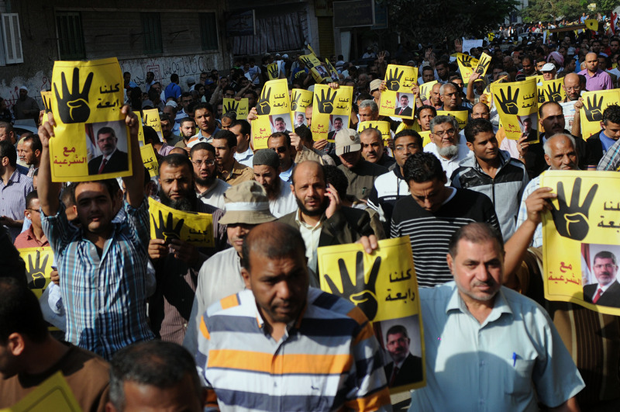
Supporters of the Muslim Brotherhood and Egypt’s ousted President Mohammed Morsi (Image: Nameer Galal/Demotix)
Amid deep polarisation and a widening crackdown on dissent in Egypt, the country’s military-backed authorities have now taken their conflict with the outlawed Muslim Brotherhood to a new front — houses of worship.
Egypt’s mosques have become the new battleground in the country’s political standoff, with the authorities recently introducing a set of measures to control religious discourse and silence pro-Muslim Brotherhood clerics they accuse of “mobilising anti-military protests and inciting violence”.
The latest measures include forbidding prayers in small mosques that are not under state control, and restricting sermons to graduates of Al Azhar University — Sunni Islam’s most prestigious institution. In recent months, no fewer than 55,000 imams lacking such credentials, have been dismissed from their jobs.
Ministry of Religious Endowments officials defend the move, insisting it is “necessary to stop lay preachers from exploiting the pulpits to advance their political interests”. For decades, the country’s mosques and universities have been fertile ground for enrolment of Muslim Brotherhood recruits and the spread of the Islamist group’s ideology. The Muslim Brotherhood , which rose to power following former president Hosni Mubarak’s ouster in February 2011, was designated a terrorist organisation by authorities in December.
In another controversial move tightening the state’s grip on mosques across the country, the Ministry of Religious Endowments has unified the theme of the weekly mosque sermons preceding Friday noon prayers. Previously, Egypt’s imams or preachers were free to choose the topic of their weekly sermons but it is now the ministry that decides what the imams should preach to the millions of worshippers attending Friday prayers.
Since the measure came into effect on 31 January, the ministry has announced a different theme each week on its official website, addressing topics that affect the daily lives of millions of Egyptians. In recent weeks, preachers have tackled a broad range of issues including developing squatter areas, environmental pollution and the role of youth in the society. The ministry has also been handing out guidelines to preachers at mosques under its control, warning that violators “will face dismissal and prosecution”.
Despite the warnings, some preachers remain defiant, refusing to comply with the instruction. They say they are the ones who should decide what to tell their followers.
“I will not be dictated by the state,” said Khalaf Massoud who preaches at the Montazah Mosque in the working class neighbourhood of Imbaba, adding that his duty is to “obey God” not “those in power”.
Other preachers have also denounced the measure as “a restrictive procedure that stifles free speech and religious freedoms”. But not all preachers are against the measure and some have even welcomed it, perceiving it as necessary for unifying the country and defusing current political tensions.
In an interview broadcast on CCTV on Friday, Imam Yasser Khattab who preaches in several mosques, said: ” The Muslim Brotherhood manipulated people and spread Islamist fundamentalism through their mosques. They incited hatred and divided the society in the last three years. There should be a stand.”
Since the toppling of Muslim Brotherhood President Mohamed Morsi by military-backed protests in July, clashes sparked by heated debate between Muslim Brotherhood supporters and opponents have frequently occurred in and around mosques after Friday noon prayers.
With a limited number of monitors to supervise the religious discourse, it is difficult for the ministry to keep track of rebel preachers refusing to abide by the new rule. Last week, four imams were summoned for interrogation at the ministry after they had allegedly called for anti-government protests during their sermons. The risk of criminal prosecution however, has failed to deter preachers like Massoud who vows to continue “to criticise any wrongdoings as people turn to me for religious guidance”.
The latest move by Egypt’s Ministry of Religious Endowments is part of the widening crackdown on Islamists and comes hot on the heels of other repressive measures taken by the authorities to curb dissent. Since the ouster of Islamist President Mohamed Morsi, the regime that replaced him has closed down TV channels and publications with links to the Muslim Brotherhood. It has also arrested and detained thousands of the group’s supporters while security forces have killed at least 1,400 Brotherhood loyalists. But with inadequate funding and insufficient manpower, it will be a daunting task for the ministry to exercise control over the country’s estimated 130,000 mosques — 10,000 of which are already independent of the state. Skeptics say it may be an impossible feat to undertake as the ministry’s resources are already stretched thin.
This article was posted on March 17, 2014 at indexoncensorship.org





